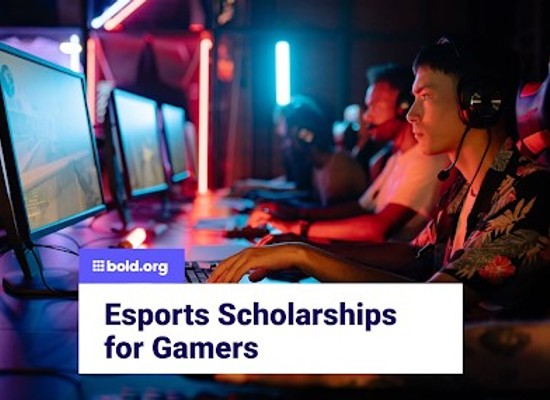
The Game Changer: My Journey Through the World of Esports Scholarships
I remember a time, not so long ago, when telling your parents you spent hours playing video games would earn you a stern lecture about wasted potential and blurry eyesight. Fast forward to today, and that same dedication, that same passion for the digital arena, can actually pave your way to a college degree. Sounds like a fantasy, right? Like something plucked straight out of a sci-fi movie? Well, let me tell you, it’s not. It’s real, it’s happening, and it’s called an esports scholarship. And if you’ve got a knack for competitive gaming, it might just be your ticket.
I first stumbled upon the idea a few years back, almost by accident. I was chatting with a friend, a brilliant kid named Alex who practically lived and breathed League of Legends. He wasn’t just good; he was phenomenally good. We’re talking challenger tier, the kind of player who makes you wonder if they have a second brain just for gaming. One day, he mentioned he was applying to colleges, and not just for academics. He was trying for esports scholarships. My jaw probably hit the floor. "An esports what now?" I asked, utterly bewildered. He just grinned, that confident, slightly smug grin only a top-tier gamer can pull off. "Yeah, man. They’re a thing. Big universities are recruiting gamers now, just like they recruit basketball players."
It sounded too good to be true, but Alex was never one to make things up. So, I started digging. And what I found blew my mind. He was right. Across the United States, and increasingly around the world, colleges and universities were launching varsity esports programs, complete with dedicated arenas, coaches, and yes, scholarships. These weren’t just token gestures either. We’re talking substantial financial aid, sometimes even full tuition waivers, for students who could prove their mettle in games like League of Legends, Valorant, Overwatch, Rocket League, CS:GO, and even sports simulations like Madden and FIFA.
Think about it for a moment. For decades, if you were an athlete, a musician, or an academic whiz, there were clear paths to higher education support. But if your passion was navigating Summoner’s Rift with surgical precision or hitting those perfect aerials in Rocket League, it was just a hobby. Now, the landscape has shifted. Institutions are recognizing the incredible skill, dedication, and strategic thinking that competitive gaming demands. They see the potential for building a vibrant campus community, attracting diverse talent, and even fostering new career paths in a booming industry.
So, how does one even begin to chase after something like an esports scholarship? It’s not as simple as just being good at a game, though that’s certainly the foundation. My journey, through Alex’s experience and countless conversations with coaches and players, taught me there’s a multi-faceted approach. It’s a bit like assembling a legendary item in an RPG – you need several key components.
First, and perhaps most obvious, is skill. You need to be genuinely exceptional at your chosen game. We’re talking high ranks, consistent performance, and a deep understanding of game mechanics, meta, and strategy. For League of Legends, that means Diamond or above. For Valorant, Immortal or Radiant. Coaches are looking for players who can immediately contribute to a competitive team. They aren’t looking to teach you the basics; they’re looking for polished talent they can refine. This means countless hours of practice, not just playing, but actively analyzing your gameplay, understanding your mistakes, and learning from professionals.
But skill alone isn’t enough. Not by a long shot. This isn’t just about individual prowess; it’s about being part of a team. Which brings me to the second crucial element: teamwork and communication. In almost every major esport, success hinges on seamless coordination. Coaches want to see that you can communicate effectively under pressure, that you can make calls, listen to your teammates, and adapt your playstyle for the greater good of the squad. During tryouts, they’ll often observe how you interact, how you handle losses, and how you celebrate wins. Are you a toxic player who blames others? Or are you a constructive force that elevates your team? Your attitude matters just as much as your KDA.
Then there’s the often-overlooked, but absolutely critical, component: academics. Let’s not forget, this is still a scholarship to a college. You’re expected to be a student first. Universities aren’t going to hand out tuition money to someone who can ace a clutch play but flunks their English class. A solid GPA and good test scores (SAT/ACT) are non-negotiable. Many programs require a minimum GPA, often around a 2.5 or 3.0, to even be considered. This was a big point Alex emphasized. He made sure to keep his grades up, even during intense ranked seasons, knowing that his academic record was just as important as his in-game stats. It shows discipline, time management, and a commitment to your education – qualities that any scholarship committee values.
Another key piece of the puzzle is coachability and a positive attitude. Imagine a coach trying to mold a team of talented but arrogant individuals. It’s a nightmare. They want players who are humble enough to learn, willing to accept feedback, and eager to improve. Being open to new strategies, adapting to team compositions, and putting in the extra effort during practice sessions will make you a far more attractive candidate than someone who thinks they know it all. It’s about showing respect for the program, the coach, and your teammates.
So, you’ve got the skill, the grades, the teamwork spirit, and a great attitude. How do you actually show all this to a university? This is where building a portfolio comes into play. Think of it like a resume for your gaming career. This could include:
- Highlight reels: Short, impactful videos showcasing your best plays, clutch moments, and strategic decision-making.
- Full VODs (Videos on Demand): Longer recordings of your gameplay that coaches can review to see your overall performance, decision-making, and communication in a more comprehensive way.
- Ranked ladder proof: Screenshots or links to your official game profiles showing your high rank and consistent performance.
- Tournament history: Any experience you have in competitive tournaments, whether online or LAN, along with results.
- References: Perhaps from a local coach, a team leader, or even a teacher who can vouch for your character and dedication.
- A personal statement/essay: This is your chance to tell your story, express your passion, explain why you deserve the scholarship, and what you hope to achieve.
Alex spent weeks meticulously curating his portfolio, making sure every highlight reel was polished and every VOD was clearly labeled. He even started streaming occasionally, not just for an audience, but to have more public VODs that showcased his personality and communication style.
Once you have your portfolio ready, it’s about networking and reaching out. Many universities have dedicated esports program websites where you can find contact information for coaches and recruiters. Don’t be afraid to send a polite email introducing yourself, attaching your portfolio, and expressing your interest. Attend online showcases or open tryouts if they’re available. Get on Twitter and follow college esports accounts. The esports community, while vast, can also be surprisingly tight-knit. Word-of-mouth and recommendations can go a long way.
The application process itself often involves a combination of academic application to the university, an esports specific application, and then, crucially, tryouts. These can be online, where you join a custom lobby with other potential recruits and the coaching staff, or sometimes in-person, which gives you a chance to see the campus and facilities. It’s nerve-wracking, for sure. Alex told me his hands were shaking during his first collegiate tryout, even though he’d played thousands of competitive games. But it’s also an incredible opportunity to showcase everything you’ve worked for.
Now, what kind of games are we talking about? The landscape is always evolving, but generally, the major titles with established competitive scenes are the ones offering scholarships.
- MOBAs: League of Legends, Dota 2
- First-Person Shooters (FPS): Valorant, Overwatch, Counter-Strike: Global Offensive (CS:GO), Call of Duty
- Sports Simulations: Madden NFL, FIFA
- Fighting Games: Street Fighter, Tekken
- Battle Royale: Sometimes Fortnite or Apex Legends, though these are less common for dedicated scholarships.
- Strategy: Hearthstone, StarCraft II (though less prevalent now).
- Car Soccer: Rocket League, which has a massive collegiate scene.
The specific games offered vary by institution, so always check the program details. Some universities might specialize in one or two games, while others have a broader array of teams.
Beyond the obvious financial aid, what are the other benefits of an esports scholarship? Oh, there are many.
- Structured Training: You’re not just playing ranked by yourself anymore. You’ll have dedicated coaches, practice schedules, VOD reviews, and strategic sessions, just like a traditional sports team. This can significantly accelerate your skill development.
- State-of-the-Art Facilities: Many programs boast incredible esports arenas with high-end PCs, peripherals, and comfortable gaming chairs. Some even have dedicated training rooms, lounge areas, and broadcast studios.
- Community and Support: You’ll be part of a team, a brotherhood or sisterhood of like-minded individuals who share your passion. This can make the transition to college much smoother and provide a built-in support system.
- Academic Support: Many programs offer academic advisors specifically for esports athletes, helping you balance your demanding schedule.
- Career Pathways: This isn’t just about playing games. Being part of a collegiate esports program opens doors to careers within the broader esports industry – coaching, analysis, shoutcasting, event management, marketing, media production, and more. You’re building a network and gaining practical experience in a rapidly expanding field.
- Personal Growth: Like any competitive endeavor, esports teaches discipline, time management, communication, problem-solving under pressure, resilience in the face of defeat, and the importance of continuous improvement. These are life skills that transcend the game.
Of course, it’s not all sunshine and highlight reels. There are challenges. The competition is incredibly fierce. Thousands of talented gamers are vying for a limited number of spots. Balancing rigorous academic work with demanding practice schedules can be tough. There’s pressure to perform, both in games and in the classroom. Burnout is a real possibility if you don’t manage your time and well-being effectively. And let’s be honest, the dream of becoming a professional esports player is still only realized by a tiny fraction of hopefuls. An esports scholarship isn’t a guaranteed path to pro status, but it is an incredible stepping stone and a valuable educational opportunity.
Alex, my League of Legends prodigy friend, did end up getting an esports scholarship to a fantastic university. I remember the day he told me, his voice thick with excitement. He described the campus, the esports arena, the coach he’d spoken with – it was everything he’d hoped for. He worked incredibly hard for it, not just in game, but in school, in building his communication skills, and in presenting himself professionally. His story isn’t unique; it’s being replicated by hundreds of students every year.
So, if you’re reading this and you’ve got that fire in your belly for competitive gaming, if you’ve put in the hours, honed your skills, and dreamed of taking your passion to the next level, don’t dismiss the idea of an esports scholarship. It’s a legitimate pathway to higher education and a potential career. Start by focusing on your game, but don’t neglect your studies. Cultivate a positive attitude and strong teamwork skills. Document your journey, build that portfolio, and don’t be afraid to reach out to programs that interest you.
The world of education is evolving, embracing new forms of talent and recognizing the value in what was once dismissed as merely child’s play. Esports scholarships are more than just a novelty; they represent a fundamental shift in how we perceive skill, dedication, and potential. They are a game changer, offering a bridge between your digital dreams and your academic future. And who knows, maybe your name will be the next one on a university roster, not just as a student, but as an esports scholar. The game is on.


